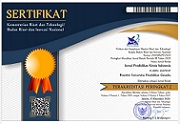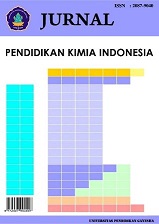MEDIA PADLET BERBANTUAN PHET SIMULATION PADA MATERI ATOM TERHADAP HASIL BELAJAR KOGNITIF DAN RESPON SISWA PADA MASA PANDEMI COVID-19
DOI:
https://doi.org/10.23887/jpk.v5i2.35612Keywords:
practical reports, communication skills, online learningAbstract
Masa pandemi Covid-19 pada saat ini sangat bergantung pada Kemajuan teknologi. Pembelajaran secara online menyebabkan suatu masalah kecemasan, ketidaksetaraan antara anak-anak karena akses, beresiko kecanduan internet, tidak memiliki disiplin belajar yang diperlukan dalam pendidikan individu Sehingga pada penelitian ini bertujuan untuk menganalisis hasil belajar dan respon siswa setelah pembelajaran menggunakan media padlet berbantuan phet simulation. Metode penelitian yang digunakan adalah quasi eksperimental desain dengan desain penelitian one group pretest and posttest. Subjek penelitian adalah siswa kelas IX. Teknik analysis data menggunakan uji paired sample t test . Hasil uji normalitas pretest dan posttest di peroleh nilai hasil pretest sebesar 0,053 dan hasil postest 0,056. Sehingga dapat disimpulkan bahwa data terdistribusi normal. Hasil uji hipotesis menunjukkan bahwa nilai siginifikansi 2 arah yaitu 0,000<0,05 yang menunjukkan bahwa H0 ditolak dan H1 diterima. Berdasarkan hasil penelitian diperoleh bahwa hasil belajar siswa antara tes pretest dan tes posttest setelah menggunkaan media padlet berbantuan phet simulation meningkat adapun respon siswa menyatakan baik terhadap penggunaaan media padlet berbantuan phet simulation ketika pembelajaran online. Jadi penggunaan media padlet berbantuan phet simulation cocok digunakan ketika proses pembelajaran online.
References
Abbas, B., Halimah, A., Nursalam, N., & Mattoliang, L. A. (2020). Pengembangan Media Pembelajaran Berbasis Multimedia. Al Asma : Journal of Islamic Education, 2(1), 97. https://doi.org/10.24252/asma.v2i1.13380.
Aditya, D. S. (2020). Journal of Technology and Science Education. Journal of Technology and Science Education, 5(3), 184–193.
Agustin, M. (2020). Tipikal Kendala Guru PAUD dalam Mengajar pada Masa Pandemi Covid 19 dan Implikasinya. Jurnal Obsesi : Jurnal Pendidikan Anak Usia Dini, 5(1), 334–345. https://doi.org/10.31004/obsesi.v5i1.598.
Ahdan, S., Putri, A. R., & Sucipto, A. (2020). Aplikasi M-Learning Sebagai Media Pembelajaran Conversation Pada Homey English. Sistemasi, 9(3), 493. https://doi.org/10.32520/stmsi.v9i3.884.
Alabbad, A. M., & Hadeel, S. B. H. (2020). Arab World English Journal (AWEJ) Special Issue on CALL No.2 July, 2015 Pp.91 – 115. Journal Arab World English, 6(2), 356–377. https://doi.org/DOI: https://dx.doi.org/10.24093/awej/call6.24.
Alghozi, A. A., Salsabila, U. H., Sari, S. R., Astuti, R. T., & Sulistyowati, H. (2021). Penggunaan Platform Padlet sebagai Media Pembelajaran Daring pada Perkuliahan Teknologi Pendidikan Islam di Masa Pandemi Covid-19. ANWARUL, 1(1), 137–152. https://doi.org/10.36088/anwarul.v1i1.52.
Apriyanti, C. (2020). The Parents Role in Guiding Distance Learning and the Obstacle During Covid-19 Outbreak. Jurnal Ilmiah Pendidikan Dasar, VII(2), 68–83. http://lppm-unissula.com/jurnal.unissula.ac.id/index.php/pendas/article/view/9075.
Basuony, M. A. K., EmadEldeen, R., Farghaly, M., El-Bassiouny, N., & Mohamed, E. K. A. (2020). The Factors Affecting Student Satisfaction With Online Education During The COVID-19 Pandemic: An Empirical Study Of An Emerging Muslim Country. Journal of Islamic Marketing, 12(3), 631–648. https://doi.org/10.1108/JIMA-09-2020-0301.
Davis, N. L., Gough, M., Taylor, L. L., Davis, N. L., Gough, M., & Taylor, L. L. (2019). Online teaching : advantages , obstacles and tools for getting it right. Journal of Teaching in Travel & Tourism, 19(3), 256–263. https://doi.org/10.1080/15313220.2019.1612313.
De Berg, A. (2016). Students as producers and collaborators: exploring the use of padlets and videos in MFL teaching. Innovative Language Teaching and Learning at University: Enhancing Participation and Collaboration, 59–64. https://doi.org/10.14705/rpnet.2016.000405.
Dewi, R. K., Wardani, S., Wijayati, N., & Sumarni, W. (2019). Demand of ICT-based chemistry learning media in the disruptive era. International Journal of Evaluation and Research in Education, 8(2), 265–270. https://doi.org/10.11591/ijere.v8i2.17107.
Dollah, S., Sehuddin, M. F., & Sakkir, G. (2021). Motivating EFL Learners to Write Using Padlet Application. ELT Worldwide: Journal Of English Language Teaching, 8(2), 240 – 254. https://doi.org/10.26858/eltww.v8i2.21169.
Duran, M. (2021). International Journal of Educational Methodology The Effects of COVID-19 Pandemic on Preschool Education. International Journal of Educational Methodology, 7(2), 249–260. https://doi.org/10.12973/ijem.7.2.249.
Fauzi, I., & Sastra Khusuma, I. H. (2020). Teachers’ Elementary School in Online Learning of COVID-19 Pandemic Conditions. Jurnal Iqra’ : Kajian Ilmu Pendidikan, 5(1), 58–70. https://doi.org/10.25217/ji.v5i1.914.
Fisher, C. D. (2017). Padlet: An Online Tool for Learner Engagement and Collaboration, Available at https://Padlet.com. Academy of Management Learning & Education, 16(1), 163–165. https://doi.org/10.5465/amle.2017.0055.
Hira, A., & Anderson, E. (2021). Motivating online learning through project-based learning during the 2020 COVID-19 pandemic. IAFOR Journal of Education, 9(2), 93–110. https://doi.org/10.22492/ije.9.2.06.
İlhan, G. O., Kaba, G., & Sin, M. (2021). Usage of Digital Comics in Distance Learning During COVID-19. International Journal on Social and Education Sciences, 3(1), 161–179. https://doi.org/10.46328/ijonses.106.
Jiemsak, N., & Jiemsak, R. (2020). The effectiveness of the quizizz interactive quiz media as an online self-assessment of undergraduate students to improve students’ learning outcomes. 2020 5th International STEM Education Conference, ISTEM-Ed 2020, 1567(2), 51–54. https://doi.org/10.1109/iSTEM-Ed50324.2020.9332675.
Karalis, T. (2020). European Journal of Education Studies Planning And Evaluation During Educational Disruption : Lessons Learned From Covid-19 Pandemic. 125–142. https://doi.org/10.5281/zenodo.3789022.
Khamim, M. (2021). Penerapan media online berbasis google classroom dalam meningkatkan pemahaman siswa pada mata pelajaran pai di masa pandemi covid-19 di sman 2 ponorogo. Journal of Chemical Information and Modeling, 1, 27.
Kobayashi, M. (2017). STUDENTS ’ MEDIA PREFERENCES IN ONLINE LEARNING. July, 4–15.
Kristiawan, M., Aminudin, N., & Rizki, F. (2021). Optimalisasi Pembelajaran Daring Berbasis Aplikasi Online bagi Calon Guru Pendidikan Anak Usia Dini. Jurnal Obsesi : Jurnal Pendidikan Anak Usia Dini, 5(2), 1905 – 1914. https://doi.org/10.31004/obsesi.v5i2.942.
Kuntarto, E. (2017). Journal Indonesian Language Education and Literature. Journal Indonesian Language Education and Literature, 3(1), 99–110. https://doi.org/10.24235/ileal.v3i1.1820 99.
Lestari, P. Y., & Kurniawan, E. H. (2018). Padlet as Media to Improve Writing Mastery of English Department Students of Uniska 2015-2016. English Franca: Academic Journal Of English Language And Education, 2(1), 1–12. https://doi.org/10.29240/ef.v2i1.373.
Mohd, N. M., Zainuddin, Mohd Azmi, N. F., Mohd Yusoff, R. C., Shariff, S. A., & Wan Hassan, W. A. (2020). Enhancing Classroom Engagement Through Padlet as a Learning Tool: A Case Study. International Journal of Innovative Computing, 10(1), 49–57. https://doi.org/10.11113/ijic.v10n1.250.
Ndihokubwayo, K., Uwamahoro, J., & Ndayambaje, I. (2020). Effectiveness of PhET Simulations and YouTube Videos to Improve the Learning of Optics in Rwandan Secondary Schools Effectiveness of PhET Simulations and YouTube Videos to Improve the Learning of Optics in Rwandan Secondary. African Journal of Research in Mathematics, Science and Technology Education, 0(0), 1–13. https://doi.org/10.1080/18117295.2020.1818042.
O’Doherty, D., Dromey, M., Lougheed, J., Hannigan, A., Last, J., & McGrath1, D. (2018). Barriers and solutions to online learning in medical education – an integrative review. BMC Medical Education, 18(130), 1–11. https://doi.org/10.1186/s12909-018-1240-0.
Özcan, H., Çetin, G., & Koştur, H. İ. (2008). The Effect of PhET Simulation-based Instruction on 6. Science Education International, 31(4), 348–355. https://doi.org/10.33828/sei.v31.i4.3.
Prima, E. C., Putri, A. R., & Rustaman, N. (2018). Learning solar system using PhET simulation to improve students’ understanding and motivation. Journal of Science Learning, 1(2), 60. https://doi.org/10.17509/jsl.v1i2.10239.
Rasmitadila, Aliyyah, R. R., Rachmadtullah, R., Samsudin, A., Syaodih, E., Nurtanto, M., & Tambunan, A. R. S. (2020). The perceptions of primary school teachers of online learning during the covid-19 pandemic period: A case study in Indonesia. Journal of Ethnic and Cultural Studies, 7(2), 90–109. https://doi.org/10.29333/ejecs/388.
Rohaeti, E., Prodjosantoso, A. K., & Irwanto. (2020). Research-oriented collaborative inquiry learning model: Improving students’ scientific attitudes in general chemistry. Journal of Baltic Science Education, 19(1), 108–120. https://doi.org/10.33225/jbse/20.19.108.
Rosario, I. H., Raúl Baños, & Alfredo Alcayde. (2020). education sciences Student Response Systems : A Multidisciplinary Analysis Using Visual Analytics. Education Sciences, 10, 348. https://doi.org/10.3390/educsci10120348.
Siskiliani, S., & Jeranah, J. (2021). Pengaruh Penggunaan Model Pembelajaran E-Learning Dengan Menggunakan Media Padlet Terhadap Hasil Belajar Matematika Pada Siswa SMA YP PGRI 3 Makassar. Journal Pendidikan Matematika, 1(1), 181–189. http://ojs.stkip-ypup.ac.id/index.php/jmy/article/view/144.
Slameto. (2010). Belajar dan Faktor-Faktor yang Mempengaruhinya. Jakarta: Rineka Cipta.
Süt, H. M., & Öznaçar, B. (2021). Effects of COVID-19 Period on Educational Systems and Institutions. International Journal of Curriculum and Instruction, 13(1), 537–551. https://files.eric.ed.gov/fulltext/EJ1285554.pdf.
Syafari, Y., & Montessori, M. (2021). Analisis Pembelajaran Daring Terhadap Motivasi Belajar Dan Prestasi Belajar Siswa Dimasa Pandemi Covid-19. Jurnal Basicedu, 5(3), 1294–1303. https://doi.org/10.31004/basicedu.v5i3.872.
Thoms, B., & Eryilmaz, E. (2014). Computers & Education How media choice affects learner interactions in distance learning classes. Computers & Education, 75, 112–126. https://doi.org/10.1016/j.compedu.2014.02.002.
Wijayanti, R. M., & Fauziah, P. Y. (2020). Perspektif dan Peran Orangtua dalam Program PJJ Masa Pandemi Covid-19 di PAUD. Jurnal Obsesi : Jurnal Pendidikan Anak Usia Dini, 5(2), 1304–1312. https://doi.org/10.31004/obsesi.v5i2.768.
Yuniar, E., Haris, A., & Amin, H. B. D. (2015). Jurnal Pendidikan Fisika Universitas Muhammadiyah Makassar Penerapan Media Simulasi Menggunakan PHET ( Physics Education. Jurnal Pendidikan Fisika, 3, 74–82.
Zorluoğlu, S. L., Ergazi, T., & Eser, Ş. (2019). Learning probability of 4th grade science curriculum learning outcomes among visually impaired students. 8(3). https://doi.org/10.11591/ijere.v8i3.17591.
Downloads
Published
How to Cite
Issue
Section
License
Authors who publish with the Jurnal Pendidikan Kimia Indonesia agree to the following terms:
- Authors retain copyright and grant the journal the right of first publication with the work simultaneously licensed under a Creative Commons Attribution License (CC BY-SA 4.0) that allows others to share the work with an acknowledgment of the work's authorship and initial publication in this journal.
- Authors are able to enter into separate, additional contractual arrangements for the non-exclusive distribution of the journal's published version of the work (e.g., post it to an institutional repository or publish it in a book), with an acknowledgment of its initial publication in this journal.
- Authors are permitted and encouraged to post their work online (e.g., in institutional repositories or on their website) prior to and during the submission process, as it can lead to productive exchanges, as well as earlier and greater citation of published work. (See The Effect of Open Access)





